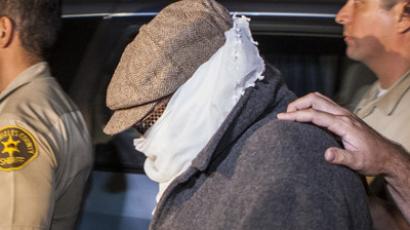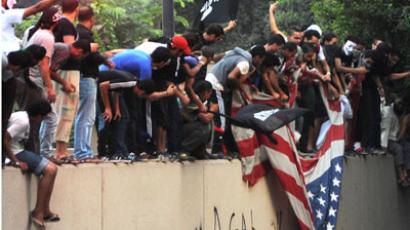'Anti-Islam film a catalyst for deeper animosity toward the US'
American embassy protests in Egypt, Libya, and Yemen are not just about a movie. The dynamics are much more complex, journalist and anti-war activist Don DeBar told RT.
This is either a case of blowback for the US, or some kind of false flag operation coordinated by Washington, he said. DeBar spoke to RT about American foreign policy and the demonstrations in the region. RT: In Egypt, the same people that Washington supported during last year's revolution are now united in their rage against America – could something like this have happened under Mubarak?Don DeBar: It’s interesting that it’s happening in Egypt, Libya, and Yemen at the same time. The movie, or actually just the trailer, which is available on YouTube, may be serving as a catalyst, but the animosity goes much deeper. The issues run much deeper. People do not go into the streets over a movie and bring RPGs with them, first of all. They generally don’t carry them around. Either this is a case of blowback, as many people are saying, with al-Qaeda or someone else being responsible for this, and the issue being this movie. Another possibility is that this is some kind of black flag operation by the US. The support of that… the evidence is that the US now has an excuse to send troops to Libya, which it didn’t have before. And there’s rather widespread resistance to the government of the [National Transitional Council]. They can’t even really assemble and hold a press conference in Tripoli yet. And there are cities in the west – so called “green zones,” where Gaddafi supporters still exist. That’s another possibility. Finally, the situation in Egypt is one where Morsi has made a break with the people over two major issues in the last week or two. His coming down on the side of the US over the situation in Syria, and the rapprochement with Israel. Neither of which are where the center of gravity exists among the Egyptian people. They’ve had revolutions since January-February of last year, when each time… when they felt the revolution was betrayed, they went out into the streets. So the dynamics underneath this are much more complex than this movie.RT: Al-Qaeda-linked elements are being blamed for some of the attacks. Do extremists really appear to be involved?DD: Well, first of all, in Libya, al-Qaeda and the US were allies. Al-Qaeda were the ground troops and the US the air support in the early stage, with the US, UK and French troops arming and guiding them from February 23rd on, as reported by the Pakistani Observer back then. Al-Qaeda is, in many people’s minds, a creature of the US intelligence operation. Noteworthy in this context is that the last official terrorist killing of a US ambassador was in Kabul at the beginning of the US involvement in the overthrow of the government in Afghanistan. That was when that country was thrown into the war that it’s still involved in. So the fact that that’s the last US ambassador to be killed is an interesting parallel to the possibility that al-Qaeda is involved in this particular episode, as well. RT: Turning to Syria now, where the US and its allies are backing the same al-Qaeda-linked elements now being accused of killing the American ambassador in Libya – will this alter Washington's stance on Syria?DD: It’s so complicated and yet so simple. The US is clearly aligned with al-Qaeda in Syria. There’s no question about that. And again, arms, money, all the supplies necessary, and manpower have been coming to al-Qaeda from the US. And they’re conducting a terror campaign against the Syrian people, and that’s being backed in the open now by the Obama administration. At the same time, the role of al-Qaeda in Yemen – you had the announcement a few days ago of the killing of supposedly the head of al-Qaeda in Yemen by a drone. We don’t know if that report was true. So it’s hard for me to pin down how this is going to play out, but it seems underneath all the appearances, that the US has these guys they call al-Qaeda out in the field with weapons, raising hell everywhere they can and at the end of the day, they believe the result – the chaos, death and destruction – serves the interest of the US somehow. RT: Barack Obama's rival for the presidency, Mitt Romney, has attacked the incumbent over the embassy attacks and killings. How's all this going to go down with US voters, less than two months before they cast their ballots?DD: The entire situation is very fortuitous for the Obama administration, politically. And again – this supports the idea that maybe this is some sort of government operation that’s underway, because the entire discussion of the campaign has suddenly shifted from the economy – which is where Obama is most vulnerable – to foreign policy, and the opening salvo being what the media in the US are calling this huge faux-pas by Romney that demonstrates he has no understanding of foreign policy. If the Obama administration gets to avoid the campaign being centered on the economy, that has to operate to their benefit, because that’s their main vulnerably. Voters in the US just aren’t that savvy on foreign policy, so if it ends up being diverted to foreign policy, Obama has a much stronger chance of winning.














